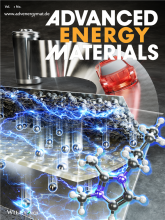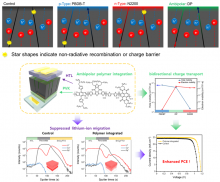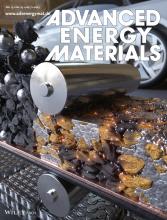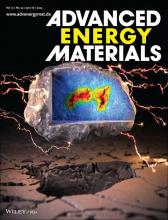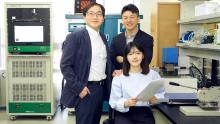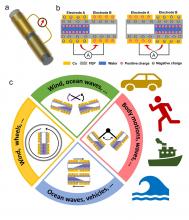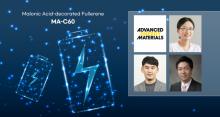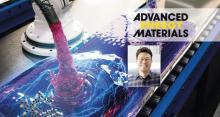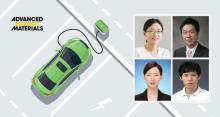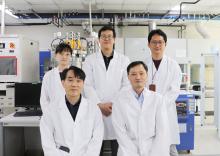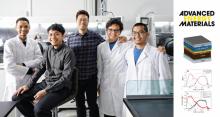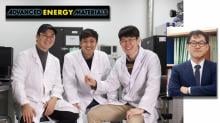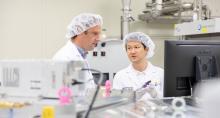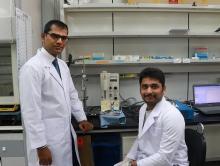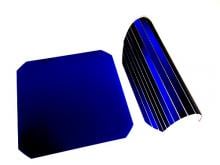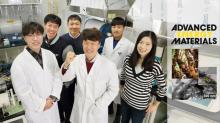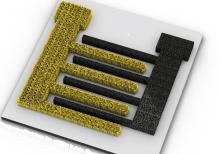Advanced Energy Materials
News
08 Dec 2023
- Professor Jong-min Choi’s research team at DGIST develops a stabilization technology that simultaneously increases efficiency and stability by applying MXene to quantum dot photovoltaic cells
- The introduction of MXene is expected to improve the performance of various electronic devices
08 Dec 2023
- Successfully developed polymer-based solid-state electrolytes with high ionic conductivity and flame-retardant properties
- Research results published in Advanced Energy Materials
03 Nov 2023
- A research team led by Professor Jong-min Choi at the Department of Energy Science and Engineering, DGIST, collaborated with a research team of Professor Bum-joon Kim’s research team at the Department of Chemical and Biomolecular Engineering, KAIST, to develop bipolar polymers, which can improve the efficiency and stability of perovskite solar cells
- Developed a process that can repair defects and maximize multifunctionality with the double introduction of bipolar polymers
15 Sep 2023
- DGIST-ETRI joint research team developed high-energy-density, high-stability all-solid-state battery electrode by applying the prelithiation technology to graphite-silicon electrodes
- Selected as the back cover study by “Advanced Energy Materials,” the best international academic journal in energy
04 Jul 2023
- DGIST-Chungnam National University Team Creates Real-Time Digital Twin Multiphysics Model for Predicting Electrochemical and Mechanical Properties of Micro-Particles for the First Time
- Cover Paper Recognition: Chosen by Prominent Journal Advanced Energy Materials
13 Jul 2021
As rechargeable batteries get more powerful, the chance of batteries overheating –thermal runaway - increases. Seeking a way to make batteries safer, researchers have investigated one of thermal runaway’s main triggers: oxygen release.
01 Jun 2021
Researchers from Korea utilized LiNO3 pre-planted lithium particles to design a stable, long-lasting lithium metal battery
18 Mar 2021
A research team from the Faculty of Engineering of The Chinese University of Hong Kong (CUHK) has recently developed a water-tube-based triboelectric nanogenerator that can efficiently convert various irregular and low-frequency mechanical energies, including ocean wave energy, into electricity, providing a new avenue for the development of “blue energy”.
20 Nov 2020
A research team, affiliated with South Korea's Ulsan National Institute of Science and Technology (UNIST) has developed an electrolyte additive (MA-C60) to reduce the problematic behaviors induced by water contamination and the ROS generated from Li‐rich cathodes.
20 Nov 2020
A recent study, affiliated with South Korea's Ulsan National Institute of Science and Technology (UNIST) has unveiled a novel technology that can improve the efficiency of quantum dot solar cells to 11.53% has been unveiled.
19 Nov 2020
A recent study, affiliated with South Korea's Ulsan National Institute of Science and Technology (UNIST) has presented new electrolyte additives for high-performance LIBs that would enable an electric vehicle (EV) to travel longer distances on a single charge.
25 Jun 2020
Most common thin-film solar panels consist of expensive rare-earth elements like indium and gallium, or highly toxic metals like cadmium. Environment-friendly solar panels consisting of the abundant materials Cu, Zn, Sn offer attractive alternatives, but are hindered by their low practical efficiency compared to their theoretical potential. Researchers from DGIST have now discovered a way to overcome these hurdles.
03 Jun 2020
Scientists from the Daegu Gyeongbuk Institute of Science and Technology, Korea, develop a novel silica-based cathode for lithium–sulfur batteries, thereby enabling the realization of batteries that can last for over 2000 charge/discharge cycles. The possibility of successfully using the unconventional silica could spark a paradigm shift in rechargeable battery designs.
09 Mar 2020
A recent study, affiliated with South Korea's Ulsan National Institute of Science and Technology (UNIST) has developed high‐efficiency, solution‐processed, hybrid series, tandem photovoltaic devices featuring CQDs and organic bulk heterojunction (BHJ) photoactive materials.
20 Feb 2020
A recent study, affiliated with South Korea's Ulsan National Institute of Science and Technology (UNIST) has demonstrated bipolar all‐solid‐state Li–S batteries (ASSLSBs) that exhibit exceptional safety, flexibility, and aesthetics, for the first time.
28 Jan 2019
Researchers have taken a major step toward the development of a new generation of solar cells, using lead-free perovskites.
09 Oct 2018
Tantalum nitride as thin layers improve the extraction of electrons from silicon solar cells.

30 Jul 2018
Laser-scribed disordered graphene significantly improves sodium-ion battery capacity.
13 Feb 2018
A team of researchers in Korea has successfully developed an alternative and cheap anode material for excellent and ultra-stable alkaline water electrolysis.
30 Jan 2018
Ultrathin, rigid silicon segments that are wired through interdigitated metal contacts produce ultraflexible high-performance solar cells.
26 Jan 2018
A team of researchers, affiliated with South Korea's Ulsan National Institute of Science and Technology (UNIST), has succeeded in developing world's first stretchable aqueous Li-ion batteries that may power the next generation of wearable devices.
23 Nov 2016
Microscale energy storage units for wearable and miniaturized electronic devices are improved using porous materials.
02 Jun 2011
A research group led by Associate Professor Hideo Ohkita of Kyoto University has succeeded in improving the efficiency of dye-sensitized polymer solar cells, and confirmed the principle of selective dye loading.
Events
Sorry, no events coming up for this topic.
Researchers
Sorry, no researchers coming up for this topic.
Giants in history
Sorry, no researchers coming up for this topic.



